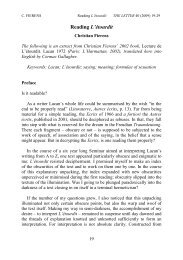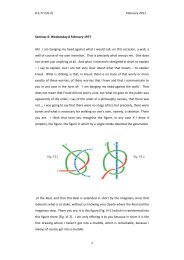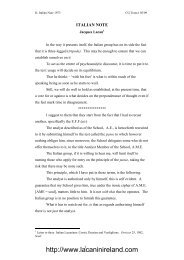At S(O) a contradictory phenomenon takes place, which is that of a communion –the word is <strong>Lacan</strong>’s <strong>in</strong> The formations of the unconscious, you will f<strong>in</strong>d it – is thatof a communion co<strong>in</strong>cid<strong>in</strong>g with a separation between the subject and the Other.The paradox is to comprehend why it is at the moment of the dissolution of thetransference, that a certa<strong>in</strong>ty may be borne <strong>in</strong> the subject, and perhaps uniquelyat that very moment. For that I am obliged to make a rapid return back to what isthe po<strong>in</strong>t that we were at at B3-R3, the po<strong>in</strong>t of désêtre.At that po<strong>in</strong>t I would say – I am obliged because to comprehend what is thenature of the emergence of the subject <strong>in</strong> a pure state – at B3-R3, rapidly, thesubject was <strong>in</strong> a position where the primary repression had disappeared, fixed bythe look of the Real. What is go<strong>in</strong>g to allow the subject to unfix himself –remember moreover, that on the subject of fixation, Freud articulates it toprimary repression – what is go<strong>in</strong>g to allow the subject to unfix himself, what isgo<strong>in</strong>g to allow the Other which is <strong>in</strong> the Real to re<strong>in</strong>tegrate his symbolic site? It isthere moreover that the art of the analyst must make itself heard. An example:an analyser <strong>in</strong> this position, where for him the knowledge of the Other wandersaround like that <strong>in</strong> the Real, puts pressure on his analyst to see the way <strong>in</strong> whichthe analyst is go<strong>in</strong>g to manifest himself, from where he speaks, one daytelephones him to press for a rendezvous to see the reaction, the analystresponds: ‘If it were necessary, we would see one another’. The message, thesignified, has noth<strong>in</strong>g very orig<strong>in</strong>al about it, nevertheless this message has theeffect of a radical <strong>in</strong>terpretation for the analyser, the effect be<strong>in</strong>g of manag<strong>in</strong>g toreconvey to the Other <strong>in</strong> his symbolic locus, quite simply because of the syntacticarticulation, which ensured that his analyst by f<strong>in</strong>d<strong>in</strong>g the formula ‘If it werenecessary’, by the <strong>in</strong>troduction of the ‘it’, subject<strong>in</strong>g himself as analyser to thedom<strong>in</strong>ance, to the predom<strong>in</strong>ance of the signifier.In the po<strong>in</strong>t B3-R3 where the subject has no recourse, he has no recourse ‘tocomprehend this notion of be<strong>in</strong>g without recourse’, evokes the night terrors ofthe child. Why effectively <strong>in</strong> the dark is the child <strong>in</strong> this position? I would sayprecisely that <strong>in</strong> the dark what happens for the child is that he does not have acorner to go to where he is not under the look of the Other; because <strong>in</strong> the darkthere is no little corner. And it is precisely <strong>in</strong> answer to the fact that under the74
look of the Real, there is not, for the subject, at B3-R3 any recourse to any cornerwhatsoever, that the recourse summoned by the signifier of the Name of theFather is go<strong>in</strong>g to be to create a little nook, namely, a nook that is go<strong>in</strong>g towithdraw him from the Other, but which is also go<strong>in</strong>g to withdraw him fromhimself by constitut<strong>in</strong>g him as not know<strong>in</strong>g, s<strong>in</strong>ce it is precisely this corner itself,the corner <strong>in</strong> which he has the most of himself, the most symbolic of himself thatis go<strong>in</strong>g to be evaporated. I would say that at that moment – scripture says to us‘let there be light’ – what is at stake at that moment is ‘let there be a hole’, this isan expression of <strong>Lacan</strong>’s. And this is perhaps what happened <strong>in</strong> the syntacticalformula that I evoked earlier. Hav<strong>in</strong>g said this, how is it that the subject – I amturn<strong>in</strong>g all the time around that as you can see – who has lost speech, is go<strong>in</strong>g torediscover it and is go<strong>in</strong>g to be able to say ‘It’s you’? Well then I would say due tothe <strong>in</strong>tervention of the signifier of the Name of the Father, which recreated theprimal repression, which made S 2 disappear and restored the o-object <strong>in</strong> its place,because of the operation of this signifier of the Name of the Father, the subjectreaches a different po<strong>in</strong>t of view, a po<strong>in</strong>t of view where he does not know theequivalence between the knowledge of the Other and the key which is lack<strong>in</strong>g <strong>in</strong>him. He discovers that it is not because the Other recognises that he is lack<strong>in</strong>g,that there is not <strong>in</strong> him the key, that he lacks the essential key of his be<strong>in</strong>g, it isnot because the Other recognises that that he knows it. I would even say thatwhen he discovers that the Other can recognise the existence of this key while notknow<strong>in</strong>g it, namely, not be<strong>in</strong>g able to restore it to him, if, <strong>in</strong> a first moment hemay fall <strong>in</strong>to despair, <strong>in</strong> truth this is go<strong>in</strong>g to re<strong>in</strong>troduce him to hope, because ifthe Other is <strong>in</strong> the position of recognis<strong>in</strong>g what he does not know, that <strong>in</strong>troducesthe dimension of the fact that the Other himself has lost this same key, that heknows well what lack is <strong>in</strong>volved, and the hope that is opened up then, is to makepresent the absence of this lost un<strong>in</strong>scribable th<strong>in</strong>g, and the hope, is precisely thatthe un<strong>in</strong>scribable can cease not to be written. And that is what is delivered atS(Ø).The unlikely paradox on which one ends up, as one might say, is how a signifier,this signifier of S(Ø), can assume this unth<strong>in</strong>kable contradiction of be<strong>in</strong>g at oncewhat ma<strong>in</strong>ta<strong>in</strong>s open the gap of what does not cease to be written – when youread, when you hear music that overwhelms you or a poem that overwhelms you,75
- Page 1:
Seminar 1: Wednesday 16 November 19
- Page 5 and 6:
after all noticed that to consist m
- Page 7 and 8:
It would be enough for you to take
- Page 9 and 10:
There had therefore been a turning
- Page 11:
Supposing that we have a torus in a
- Page 15 and 16:
topology encourages us to do so. Th
- Page 17 and 18:
and me, and I who, in short, by din
- Page 19 and 20:
we cut it in two, the front and the
- Page 21 and 22:
is itself a hole and in a certain w
- Page 23 and 24: Everyone knows that this is how thi
- Page 25 and 26: Seminar 3: Wednesday 21 December 19
- Page 27 and 28: proceed to this double cut, a doubl
- Page 29 and 30: The inside and the outside in this
- Page 31 and 32: egards the structure of the body, o
- Page 33 and 34: inspired by it and its inspiration,
- Page 35 and 36: music on you, is that it has this p
- Page 37 and 38: from the beloved to the lover. What
- Page 39 and 40: that the little o-object is not uni
- Page 41 and 42: Seminar 4: Wednesday 11 January 197
- Page 43 and 44: short I called the discourses; the
- Page 45 and 46: It is flattened out, and in a way t
- Page 47 and 48: astonishes me still more, is not th
- Page 49 and 50: Seminar 5: Wednesday 18 January 197
- Page 51 and 52: see it here, namely, something that
- Page 53 and 54: namely, that everything that concer
- Page 55 and 56: Let’s see. Let us try to see here
- Page 57 and 58: - X: You can’t hear me because pr
- Page 59 and 60: Seminar 6: Wednesday 8 February 197
- Page 61 and 62: its relationship to the body that w
- Page 63 and 64: that in the position B1, would be t
- Page 65 and 66: is in the position of maintaining t
- Page 67 and 68: Effectively the problem of primary
- Page 69 and 70: which I will return later, what is
- Page 71 and 72: the object of desire is not unknown
- Page 73: that he tells the truth. You see th
- Page 77 and 78: accentuated by him is the search fo
- Page 79 and 80: What is happening, is it not, the d
- Page 81: grounded and articulatable way, and
- Page 84 and 85: eason is said to be purloined, whil
- Page 86 and 87: Borromean knot with that of the Ima
- Page 88 and 89: Alain Didier Weill, for his part, i
- Page 90 and 91: Seminar 8: Wednesday 8 March 1977Wh
- Page 92 and 93: shouldn’t tell you, at 7.15 at Ju
- Page 94 and 95: means that the tongue fails, that,
- Page 96 and 97: of his time as a formidable cleric
- Page 98 and 99: It is very difficult not to waver o
- Page 100 and 101: I remind you that the place of semb
- Page 102 and 103: this term in the feminine, since th
- Page 104 and 105: which coincides with my experience,
- Page 106 and 107: and to put that for you in black an
- Page 108 and 109: see, does not see too great an inco
- Page 110 and 111: that exists, he says what he believ
- Page 112 and 113: In short, one must all the same rai
- Page 114 and 115: particular besides, neurotic, a sex
- Page 116 and 117: functioning as something else. And
- Page 118 and 119: mean to deny? What can one deny? Th
- Page 120 and 121: slipping from word to word, and thi
- Page 122 and 123: Seminar 12: 17 May 1977People in th
- Page 124 and 125:
y writing. And writing only produce
- Page 126 and 127:
not pinpointed it? He calls this a














